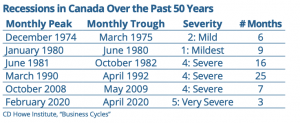 Labour markets and household balance sheets are at healthy levels to support consumer resilience, and consumer spending has been robust in the services industry. While some corporate earnings have missed expectations recently, it was anticipated that there would be a period of adjustment as we returned to normal from the pandemic. In some cases, record stimulus skewed consumer demand; in others, the economic shutdowns created ongoing supply chain issues. High inflation has also driven up many companies’ costs, but this inflation is not expected to be permanent. Recessions are also usually characterized by excesses of inventory, capacity or credit, which aren’t largely apparent at the moment. This is not to suggest we don’t face many challenges. The pandemic has caused a variety of problems, including significant stimulus debt, higher inflation, supply chain disruptions, slower growth and more. We are now confronted with new issues created by the conflict overseas. Continued patience is needed as we resolve these issues and move forward. However, some balance may be warranted to address the current discussion of recession. Investors should also remember that portfolios positioned for the longer term have been structured with the expectation that economic and financial markets will experience both ups and downs. Most importantly, when a recession eventually does arrive, remember that it will be temporary.
Labour markets and household balance sheets are at healthy levels to support consumer resilience, and consumer spending has been robust in the services industry. While some corporate earnings have missed expectations recently, it was anticipated that there would be a period of adjustment as we returned to normal from the pandemic. In some cases, record stimulus skewed consumer demand; in others, the economic shutdowns created ongoing supply chain issues. High inflation has also driven up many companies’ costs, but this inflation is not expected to be permanent. Recessions are also usually characterized by excesses of inventory, capacity or credit, which aren’t largely apparent at the moment. This is not to suggest we don’t face many challenges. The pandemic has caused a variety of problems, including significant stimulus debt, higher inflation, supply chain disruptions, slower growth and more. We are now confronted with new issues created by the conflict overseas. Continued patience is needed as we resolve these issues and move forward. However, some balance may be warranted to address the current discussion of recession. Investors should also remember that portfolios positioned for the longer term have been structured with the expectation that economic and financial markets will experience both ups and downs. Most importantly, when a recession eventually does arrive, remember that it will be temporary.

The information contained herein has been provided for information purposes only. Graphs, charts and other numbers are used for illustrative purposes only and do not reflect future values or future performance of any investment. The information has been provided by J. Hirasawa & Associates and is drawn from sources believed to be reliable. The information does not provide financial, legal, tax or investment advice. Particular investment, tax, or trading strategies should be evaluated relative to each individual’s objectives and risk tolerance. This does not constitute a recommendation or solicitation to buy or sell securities of any kind. Market conditions may change which may impact the information contained in this document. Wellington-Altus Private Wealth Inc. (WAPW) and the authors do not guarantee the accuracy or completeness of the information contained herein, nor does WAPW, nor the authors, assume any liability for any loss that may result from the reliance by any person upon any such information or opinions. Before acting on any of the above, please contact me for individual financial advice based on your personal circumstances. WAPW is a member of the Canadian Investor Protection Fund and the Investment Industry Regulatory Organization of Canada. ©️ 2023, Wellington-Altus Private Wealth Inc. ALL RIGHTS RESERVED. NO USE OR REPRODUCTION WITHOUT PERMISSION

